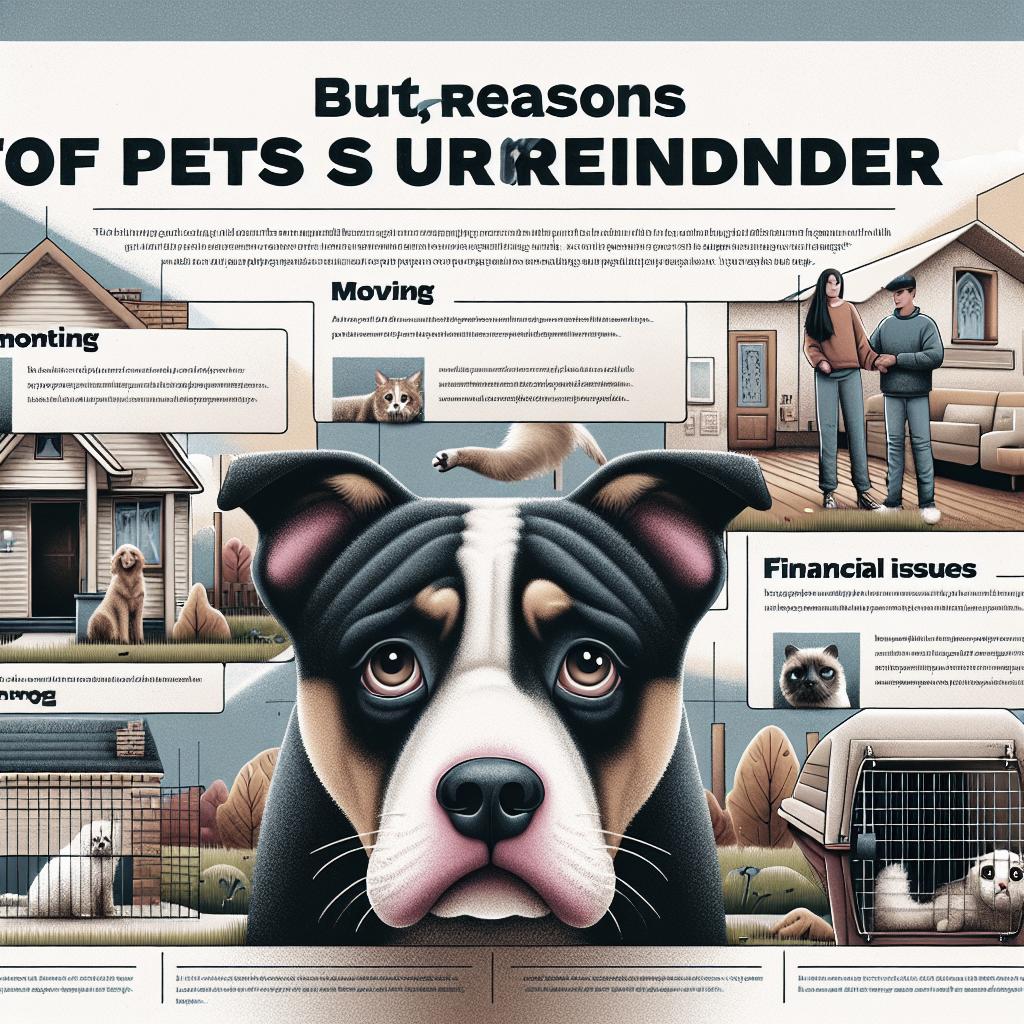<>
The sad reality of pet surrenders is one that shelters across the globe face daily. Each year, millions of pets are turned over to shelters due to various reasons, ranging from the owner’s unanticipated life changes to financial constraints. Understanding why people surrender their pets can help us address these issues and provide better support for pet owners, potentially reducing the number of animals entering shelters. Below, we delve into some common reasons pet owners come to make the heart-wrenching decision to give up their furry companions. We will also look at potential solutions and future prospects for mitigating this growing concern.
Below are some of the more common reasons why people decide to give away their pet
Time factor
One of the most prevalent reasons owners surrender their pets is the time commitment required. Pets, especially dogs, need regular walks, playtime, and attention. Busy professionals or individuals with unpredictable schedules may find it challenging to dedicate the necessary time to properly care for a pet. Consequently, they may feel overwhelmed and ultimately decide to surrender their pet to ensure it receives the care it needs. Additionally, time-related issues often arise with pets that have high energy levels or specific needs. For example, certain dog breeds require rigorous daily exercise and mental stimulation. If owners cannot meet these demands, the pet may develop destructive behaviors, further prompting the decision to surrender.
Lack of experience
Many first-time pet owners underestimate the responsibilities associated with pet ownership. The initial excitement of bringing a pet home often dwindles as the realities of training, veterinary care, and routine maintenance set in. Inexperienced owners may struggle with basic tasks such as house training or addressing behavioral issues, leading to frustration and the eventual decision to surrender the pet. Moreover, some pet owners may not fully comprehend the lifespan and developmental stages of their pets. For instance, puppies and kittens require extensive training and socialization, and seniors need specialized care. Lack of knowledge about these stages can result in inappropriate care and ultimately the surrender of the animal.
Changed life situation
Life is unpredictable, and significant changes in personal circumstances often lead to pet surrenders. For example, a job loss or relocation can drastically alter an individual’s ability to care for a pet. Moving to a new home, especially one with restrictions on pet ownership, can force owners to surrender their animals. Similarly, changes within the family, such as a new baby or a divorce, can complicate pet ownership. In such situations, pets may no longer fit into the new family dynamic, or their care may become secondary to other pressing concerns, leading to their surrender.
Animal health and age
Caring for a pet with chronic health issues can be both emotionally and financially draining. Many pets are surrendered because their owners cannot afford the necessary medical treatment or lack the expertise to manage their health needs. Health issues such as diabetes, cancer, or severe allergies can be overwhelming for owners, prompting surrender as the only viable option. Age is another significant factor. Senior pets often require more frequent veterinary care, special diets, and medications, which can become burdensome for some owners. Older animals may also come with behavioral or mobility issues that demand additional care, ultimately leading their owners to surrender them.
Boredom/Disinterest
While owning a pet can be incredibly rewarding, it also demands a long-term commitment that some people may not fully anticipate. Over time, the novelty of having a pet can wear off, leading to boredom or disinterest. When the initial excitement fades, some owners may neglect their pet’s needs, resulting in behavioral issues or a diminished quality of life for the animal. This lack of interest can be particularly problematic in households with children. Initially, children may beg for a pet, but their enthusiasm may wane quickly, leaving the parents with the bulk of the responsibilities. If the family is unable or unwilling to meet these needs, they may opt to surrender the pet.
Unwanted litters
Despite numerous campaigns promoting spaying and neutering, unwanted litters are still a major reason for pet surrenders. Pet owners who do not spay or neuter their animals may find themselves with more pets than they can handle when their pets reproduce. This is especially common with cats, which can breed multiple times a year. Unplanned litters can quickly overwhelm owners, both in terms of care and finances, leading them to surrender the additional animals. Shelters often receive entire litters of puppies or kittens, along with their mothers, because owners were unprepared for the responsibilities associated with breeding.
Behavioural issues
Behavioral problems are a significant reason pets are surrendered to shelters. Issues such as aggression, excessive barking, destructive chewing, and house-soiling can make it extremely difficult for owners to provide a harmonious home environment. Many of these problems stem from poor socialization, lack of training, or unmet needs for physical and mental stimulation. Unfortunately, not all pet owners seek professional help for these issues. Many are unaware that behavioral problems can often be resolved with training and consistency. Instead, they may choose to surrender the pet as a last resort, hoping it will find a more suitable home.
Financial factor
The financial burden of pet ownership is another common reason for surrenders. Vet bills, food, grooming, and other expenses can add up quickly. In tough economic times, these costs may become unmanageable for some pet owners, leading them to the difficult decision of giving up their animals. Unexpected medical expenses are particularly challenging. A sudden illness or injury that requires costly treatment can be overwhelming, especially for those without pet insurance. When faced with financial hardship, some owners feel they have no choice but to surrender their pet to ensure it receives the necessary care.
Profitability
While it may seem unfathomable to some, a portion of pets are surrendered for reasons related to profitability. This is particularly evident in the case of exotic pets or certain dog breeds that may have been acquired for breeding purposes. When the financial returns don’t meet expectations, or the cost of care outweighs the benefits, these pets are often surrendered. Additionally, some backyard breeders and pet flippers acquire animals with the sole intention of selling them for profit. When these animals don’t sell or develop health issues, they are frequently abandoned or surrendered to shelters.
It’s a way of giving a loving new home to a shelter animal
Despite the many unfortunate reasons animals are surrendered, some surrenders occur with noble intentions. Owners who genuinely cannot care for their pets might surrender them in hopes of giving them a second chance at finding a loving home. Shelters can provide the necessary medical care, socialization, and training to make them more adoptable. Moreover, surrendering pets to reliable shelters can reduce the risk of abandonment or mistreatment. Shelters have the resources and networks to find suitable families, ensuring that the animals are given the best possible chance for a happy and stable future.
| Reason | Description |
|---|---|
| Time factor | Lack of time to properly care for and engage with pets, leading to surrender. |
| Lack of experience | Inexperienced owners struggling with pet care responsibilities. |
| Changed life situation | Significant life changes, like moving or new family dynamics, making pet care challenging. |
| Animal health and age | Expenses and efforts tied to caring for senior or sick pets. |
| Boredom/Disinterest | Loss of initial enthusiasm, leading to neglect and surrender. |
| Unwanted litters | Unplanned litters overwhelming the owner’s capacity to care for them. |
| Behavioral issues | Untreated behavioral problems prompting pet surrender. |
| Financial factor | Financial incapability to manage the costs of pet care. |
| Profitability | Pets acquired for profit and then surrendered due to lack of financial benefits. |
| Give a loving home | Surrenders made with hopes of finding a better home for the pet. |


